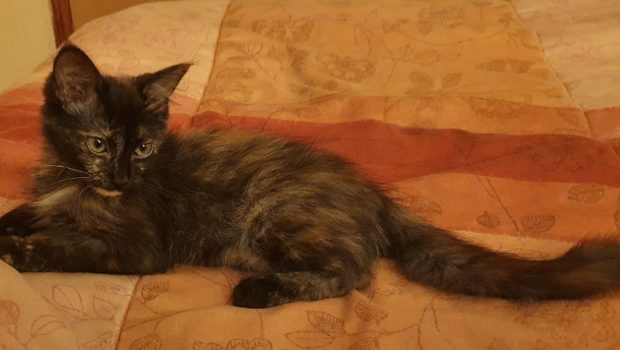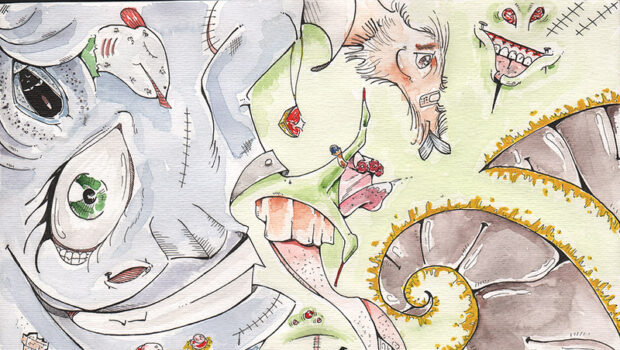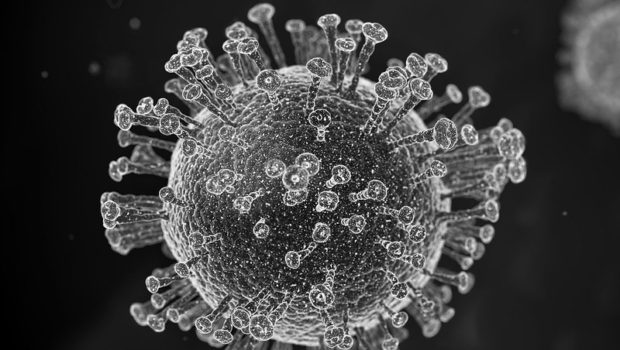Surviving the End Times with a Cat, a How-to
Andrea Chapela
Translated by Allana Noyes
1: Adopt a cat.
It is the 26th of March. Your friend posts the photo on Instagram, a black kitten with huge green eyes. The caption reads, “Anyone want this kitten? ☹ My cousin and I found it and we can’t keep it.” You immediately feel the urge to tell her that this must be destiny calling, that you want it. You’ve thought more than once that you might adopt a cat after you settled down and got a hold on your finances. Sure, now is definitely not that time, but nonetheless you can’t stop staring at the photo. You write your friend, “I want it, but I need to think about it, can I get back to you tomorrow?” That night you have an anxiety dream where you adopt the cat and go out to buy supplies but everything is closed and the cat is pissed at you and you think shit, this is the way it’s going to be for the next fifteen years of our shared lives together and you regret ever having made the decision to adopt it. The fact that you have this dream does not change the fact that as soon as you wake up you write a text saying yes, you’ll take it. You’ll swing by tonight.
2: Give your cat a too-on-the-nose name.
On the way to your friend’s house you stop into your neighborhood vet’s office for some advice. You make an appointment to come back another day to get it a checkup–you’re still not sure if it’s a boy or a girl and your friend doesn’t know either. You want to be prepared and you’ve got a wild hair so you go ahead with the litter box and the eco-friendly litter and some toys and an adorable little bed that is so soft and squishy and which seems like a screaming deal at the time but that the cat will never use, not once. When you get to your friend’s house, you are presented to a furball with eyes, so scrawny and small you can hold it in the palm of your hand. They found it in on the sidewalk hiding under some cacti. It meows a lot when you hold it and the first thing it does is climb your shirt and perch on your shoulder. That night while you’re watching a movie it repeats the gesture and stays there until it falls asleep. The vet says they’ll have to deworm it and confirms what her calico fur has lead you to believe all along—it’s a girl. They ask you for her name so they can write it on her vaccination documents. A cat needs a good name, so if you want you can take some time to think about it. You confess that you were thinking of naming her Pandemia. Fortunately, the vet thinks this is as funny as you do, and so down it goes on her official paperwork. Some of your friends who don’t share your dark sense of humor will prefer to call her Pan or Pandi but you’ll never drop the habit of just calling her “cat.” Over the course of the following weeks this repeated word will lose all meaning until it becomes as commonplace as any other name.
3: Express yourself.
She likes to curl up in your lap while you stroke her belly. The slightest human contact makes her start purring. A friend called her a lap warmer, and it’s true, she demands periodic petting throughout the day. In the morning when she hears that you’re awake, she emerges from her favorite hiding spot (the gap between the cushions and the back of the futon) and jumps up on the bed so you’ll play with her. She meows, prances along your back, nibbles at your fingers. At first you think she’s hungry, but then you realize this is her way of saying good morning. Her presence keeps you from falling back asleep. Her presence makes you get out of bed before noon. The vet says kittens are very chatty and that if you give it a try and talk back, you’ll eventually start to pick up the tonal subtleties of her meows. She also says the quarantine is a great opportunity to get to know each other. You take her advice. Pandemia meows and you answer, sometimes mirroring her meow or saying her name. Sometimes you answer in your own language, telling her what’s on your mind or what’s troubling you. Your friends ask how it’s going in your new apartment, the one you just moved into by yourself. You’ve often thought it would be a symbolic step toward establishing your independence but during quarantine you’ve come to find it’s pretty damn lonely. That’s why, in the hours between skype calls when your phone falls silent, talking it over with Pandemia is a deep comfort to you.
4: Spam your contacts with pix of your new cat.
Watching her run all over the apartment has become your most beloved pastime during quarantine. It’s been a long time since you had a pet, and you’re shocked by the depth of her personality: her conversation, her goofy bursts of energy and general zaniness. You tell your mom that she’s going through an oral-fixation phase. She gnaws on everything: book corners, your metal fountain pen, bobby pins you leave laying around, your knees and elbows, papers on your desk. It surprises you how quickly her small body heats up when she’s been lying in the sun and that she has a favorite toy she drags between rooms and hides in strange places. That when she wakes up and doesn’t know where you’ve gone, she looks for you (later on she’ll ignore you completely). You snap a picture every time she does something cute. Like that one time she stuck her whole head in your water glass to get a sip even though you’d just filled her dish. Or when she lies next to you on the chair and falls asleep in funny positions. When she kamikaze-leaps to the windowsill to enjoy an open window. You send them to your parents, your animal-lover friends, you save them to your phone. After three weeks you can’t pick her up with one hand, and the vet says she sure isn’t a little furball anymore, she’s gained three-hundred grams. She looks like a bonified kitten. She asks you about your routine and you tell her about your half-hearted attempts at cat training. Later, you think, even better if a quarantine routine organically emerges, but it’s not really what’s most important. You’re just two beings sharing a space, trying to adapt to these circumstances together. Pandemia helps you direct your attention outside of yourself. She gives you some much needed perspective.
5: Time passes, let it.
You think back to that first night when you still didn’t know if you were going to adopt Pandemia. About how you wrote to your sister confessing that the thought scared you. It’s my commitment phobia! you said, clearly half-joking. Your sister said you’d get over it. A cat is the midpoint between committing to nothing and committing to a human. Lately, you’ve been standing on the precipice of becoming a responsible human adult, wondering to yourself if caring for another creature is equally indicative of your burgeoning maturity as your brand-new adult apartment. At the very least, the adoption is a sign you’ve come back to the city for good this time. Not only that, you think, but she’s adopted you too. She recognizes her name or at least the sound of your voice. She has her favorite hiding places and the apartment is filled with her things. You think that if it weren’t for the quarantine, you never would have adopted her at all. Maybe it’s true that our most heart-felt desires come to light during dire times. It makes sense that people act more impulsively when faced with the end of normalcy. Some people, you’ll joke later, took the plunge and moved in with their significant other. Some professed their long-harbored love for a platonic friend, while others did a dramatic home renovation. You adopted a cat.
 Andrea Chapela is the author of Vâudïz (Ed. Urano, 2008-2015), Degrees of Myopia (Tierra Adentro, 2019), A year of room service (UdG, 2019) and Ansibles, profilers and other ingenuity machines (Almadia, September 2020). She has received the 2018 Gilberto Owen National Literature Prize for short stories, the 2019 Juan José Arreola National Literature Prize and the 2019 José Luis Martínez National Prize for Young Essays.
Andrea Chapela is the author of Vâudïz (Ed. Urano, 2008-2015), Degrees of Myopia (Tierra Adentro, 2019), A year of room service (UdG, 2019) and Ansibles, profilers and other ingenuity machines (Almadia, September 2020). She has received the 2018 Gilberto Owen National Literature Prize for short stories, the 2019 Juan José Arreola National Literature Prize and the 2019 José Luis Martínez National Prize for Young Essays.
Allana Noyes is a literary translator from Reno, Nevada. She holds an MFA from the University of Iowa and in 2015 was granted a Fulbright to Mexico. In 2018, she was awarded the World Literature Today Translation Prize in Poetry, and in 2020 was selected for the emerging translator fellowship at the Banff Centre Residency program. Her translations have appeared in World Literature Today, Asymptote, Lunch Ticket, Mexico City Lit, Exchanges, Litro, and are forthcoming in InTranslation/BrooklynRail, ANMLY, and the Catapult/Soft Skull anthology of short horror fiction, Tiny Nightmares.
©Literal Publishing
Posted: July 15, 2020 at 10:31 pm










